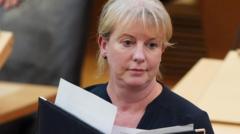Will the Finance Secretary Break the No Tax Rise Pledge?

Published: 2025-11-09 13:00:14 | Category: sport
Scotland's Finance Secretary, Shona Robison, has raised concerns that she may need to reconsider her commitment to not raise income tax before the next Holyrood election due to potential cuts in funding from Westminster. With Chancellor Rachel Reeves expected to announce significant tax changes in her upcoming Budget on 26 November, including a possible rise in income tax that could reduce Scotland's funding by £1 billion, Robison is seeking urgent discussions to address these financial uncertainties.
Last updated: 24 October 2023 (BST)
What’s happening now
As the UK government prepares for the Autumn Budget, speculation is mounting regarding tax increases that could significantly impact Scotland's financial landscape. Shona Robison's warning of a "nightmare situation" reflects the precarious position of the Scottish government amid potential changes to income tax and national insurance contributions. Robison's call for an urgent meeting with Chancellor Reeves underscores the urgency of addressing these looming financial challenges, which could force her to amend previously set tax strategies in response to Westminster’s decisions.
Key takeaways
- Shona Robison may need to raise income tax in Scotland if Westminster's funding is cut.
- Chancellor Rachel Reeves is expected to announce changes to income tax and national insurance in her Autumn Budget.
- A potential 2p rise in income tax could lead to a £1 billion loss in funding for Scotland.
- The Fiscal Framework agreement may be affected by any changes made to national insurance or income tax.
- Robison's commitment to stable tax rates faces pressure from Westminster's financial decisions.
Timeline: how we got here
The situation surrounding Scotland's income tax and funding from Westminster has evolved as follows:
- **April 2017**: The Scottish government gains the power to set its own income tax rates and bands.
- **April 2018**: Scotland begins implementing its new tax powers.
- **26 November 2023**: Chancellor Rachel Reeves is set to announce her Autumn Budget, which may include a rise in income tax.
- **October 2023**: Shona Robison warns of potential £1 billion funding cuts from Westminster.
What’s new vs what’s known
New today/this week
Shona Robison's comments reflect growing anxiety in Scotland about the upcoming Budget and its potential implications. The possibility of a £1 billion reduction in funding due to Westminster's financial decisions has prompted her to reconsider previous commitments to income tax stability.
What was already established
Scotland has the authority to set its own income tax rates since 2017, and it has established a framework for how these taxes interact with Westminster funding through the Fiscal Framework. The relationship between UK tax changes and Scottish funding has been a contentious issue, particularly regarding the Block Grant Adjustment (BGA).
Impact for the UK
Consumers and households
For consumers in Scotland, potential changes in income tax and national insurance could result in higher tax bills, particularly for those earning above £30,300. The implications of these changes could also affect public services funded by tax revenue, such as education and health services.
Businesses and jobs
Businesses may face increased operational costs if income tax rises. Additionally, the uncertainty surrounding tax policy could deter investment and hiring, as businesses assess the stability of the economic environment in Scotland. The potential for a tax increase may also influence decisions on business relocation or expansion.
Policy and regulation
Changes in tax policy from Westminster could prompt discussions about the need for alterations to the Fiscal Framework. Robison's call for a meeting with the Chancellor indicates a desire to renegotiate aspects of this agreement to prevent negative financial consequences for Scotland.
Numbers that matter
- £1 billion: Potential funding cut for Scotland if UK income tax rises.
- 20%: More funding per head for Scotland compared to the rest of the UK, according to the Treasury.
- £28: Maximum tax savings for individuals earning below £30,300 in Scotland compared to the rest of the UK.
- £1,528: Additional tax paid by a Scottish resident earning £50,000 compared to their counterparts in the rest of the UK.
- £5,207: Extra tax paid by those earning £125,000 in Scotland compared to the rest of the UK.
Definitions and jargon buster
- Fiscal Framework: An agreement that outlines the financial relationship between the UK and Scottish governments regarding tax powers and funding.
- Block Grant Adjustment (BGA): A mechanism that adjusts Scotland’s funding from Westminster based on the taxes it can raise independently.
- Barnett Formula: A system used to determine the amount of public expenditure allocated to Scotland, Wales, and Northern Ireland.
How to think about the next steps
Near term (0–4 weeks)
In the immediate future, stakeholders should closely monitor announcements from Chancellor Reeves regarding the Autumn Budget. The specifics of tax changes will be critical for assessing their impact on Scotland's financial position.
Medium term (1–6 months)
As the Scottish government prepares its budget in January, the implications of Westminster’s decisions will necessitate strategic planning. This may involve revisiting tax strategies and budget allocations to mitigate funding cuts.
Signals to watch
- The outcome of the Autumn Budget on 26 November 2023.
- Robison's response to any tax changes announced by the Chancellor.
- Economic indicators that reflect public sentiment regarding living and working in Scotland.
Practical guidance
Do
- Stay informed about the Chancellor's announcements and their implications for Scotland.
- Engage with local representatives about your views on tax and public spending.
- Consider how any tax changes may affect your financial planning.
Don’t
- Ignore the potential impact of tax changes on public services.
- Make any hasty financial decisions without considering the forthcoming Budget.
- Assume that tax rates will remain stable without monitoring developments closely.
Checklist
- Review your current tax position and how it may change based on government announcements.
- Assess your budget for potential changes in disposable income.
- Stay updated on local news regarding the Scottish government’s response to Westminster’s Budget.
Risks, caveats, and uncertainties
The situation remains fluid, and specific outcomes from the Chancellor's Budget are uncertain. It is essential to acknowledge that any proposed tax changes could impact different groups in various ways, with potential unintended consequences for Scotland's economy and public services. Stakeholders should remain cautious as they navigate these discussions and await further clarity from Westminster.
Bottom line
Scotland's financial landscape is at a critical juncture, with potential changes in income tax and national insurance on the horizon. Shona Robison's concerns highlight the need for careful consideration of the implications for both households and public services. As the situation unfolds, proactive engagement and strategic planning will be essential for mitigating any adverse impacts.
FAQs
Will income tax rates change in Scotland?
There is uncertainty regarding whether income tax rates in Scotland will change, as Shona Robison has indicated a need to revisit tax strategies in light of potential funding cuts from Westminster.
What is the Fiscal Framework?
The Fiscal Framework is an agreement that governs the financial relationship between the UK and Scottish governments, particularly regarding tax powers and funding arrangements.
How could the Autumn Budget affect Scotland's finances?
The Autumn Budget may lead to significant changes in income tax and national insurance, which could reduce Scotland's funding from Westminster and necessitate adjustments in the Scottish government's budget planning.



